


Americans promoted Vice President George H.W. Bush to the presidency in hopes that he would be a suitable stand-in for a third term of Ronald Reagan. The only problem? George H.W. Bush was not Ronald Reagan. His weaknesses on domestic issues opened the door for not one, but TWO, major challengers. But no candidate is perfect…
The Last Four Years
The Reagan years brought a resurgence of American exceptionalism, most evident in the reinvigorated economy. But this growth came at a cost — literally, in the form of $2.8 trillion in federal debt, three times more than it had been in 1980. This meant that President Bush’s ability to enact major domestic legislation was limited. That was alright with conservatives, though, as long as he maintained the economic status quo. Unfortunately, in order to balance the budget, something had to give. Republicans called for continued cuts to government spending. Democrats, who controlled Congress, insisted on raising taxes for the rich. Budget negotiations for the upcoming 1991 fiscal year were particularly divisive, and Bush was forced to compromise. In June, he announced his intention to back down from his “no new taxes” campaign pledge. After a brief government shutdown, a compromise bill was passed, both cutting spending and raising taxes. Conservatives felt betrayed. They sensed that Bush was weak and not truly on their side. Worse yet, Bush spent more than $100 billion to bail out the savings and loan industry, after years of deregulation led to risky investments and instability. This did not feel like a continuation of Reagan’s conservative revival.
Money problems aside, Bush worked with Congress to pass two major pieces of domestic legislation. The Americans with Disabilities Act prohibited discrimination based on disability in employment and public accommodations, matching the Civil Rights Act of 1964. The Clear Air Act Amendments aimed to reduce industrial emissions of toxic chemicals. Public interest in environmentalism had spiked following the Exxon-Valdez oil tanker disaster in 1989. Even though these acts were the result of bipartisan efforts, conservatives were predictably unhappy with the high costs and government intrusion in private business.
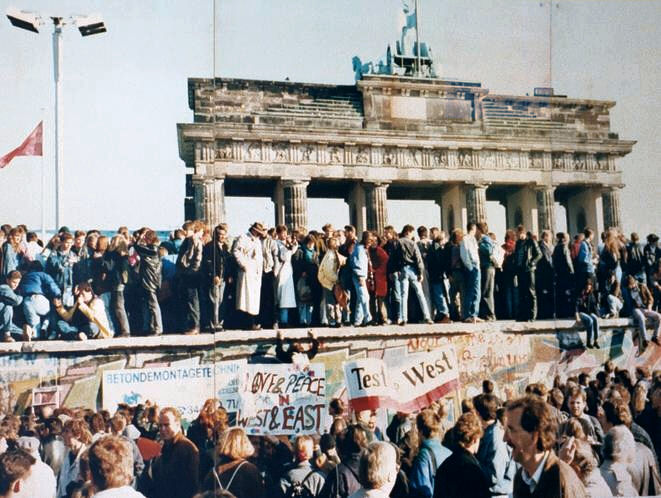
One blessing from the Reagan years was the thawing of the Cold War. After taking some time to re-familiarize himself with the situation and develop his own strategy (a period the Russians referred to as the “pauza,” or pause), Bush continued to improve relations with the USSR. In November, 1989, East Germany opened its borders and tore down the Berlin Wall. The event marked the symbolic end to Communist control of Eastern Europe. The Bush Administration worked quickly to re-unify the country and usher it into NATO (against Soviet wishes). Bush himself appeared unenthusiastic about the development. His public reaction was simply, “I’m very pleased.” He later defended this statement by adding, “I am not an emotional kind of guy.” Bush knew that it was important not to gloat in the face of the Soviets in order to preserve their good relations, but conservatives couldn’t help but imagine a more exciting reaction from their dream-president, Reagan. Negotiations continued, resulting in the Strategic Arms Reduction Treaty (START) in 1991. Soviet leader Mikhail Gorbachev faced a coup in 1991. He remained in power, but the USSR’s decline was undeniable. Soviet Republics began declaring independence in the fall and Gorbachev resigned at the end of the year.
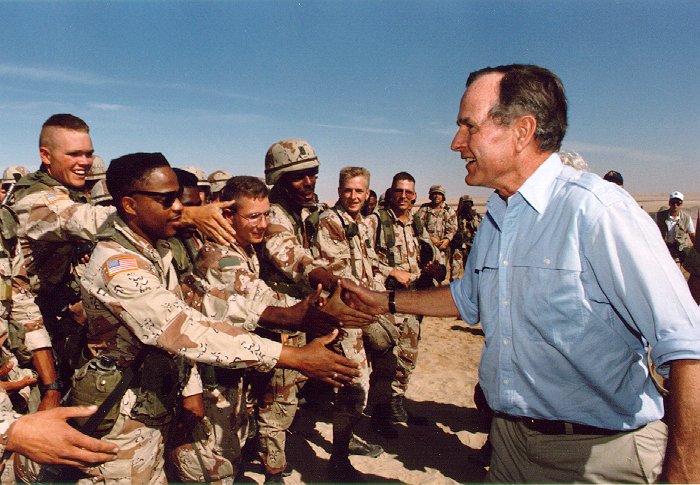
The most important test to President Bush’s leadership was the Persian Gulf War. On August 2, 1990, Iraq invaded neighboring Kuwait. Iraqi leader Saddam Hussein hoped to seize Kuwait’s land and oil, an outcome that frightened the West. The crisis gave Bush an opportunity to showcase his foreign policy skills and wide array of international contacts (built during his time as ambassador to the UN, liaison to China, and director of the CIA). Despite being caught off-guard, the Bush Administration acted quickly to build a coalition to stop Hussein. Coincidentally, at the time of the invasion, President Bush was at a conference with British Prime Minister Margaret Thatcher, and his Secretary of State was with the Soviet Foreign Minister. This allowed the US to quickly condemn the attack, with backing from the UK and, surprisingly, the USSR. The United Nations demanded Iraq’s immediate withdrawal and imposed economic sanctions. As Iraqi troops gathered at the border of Saudi Arabia, Middle Eastern countries joined the coalition, too. Bush deployed troops in “Operation Desert Shield” to protect the border and provide stability. After months of diplomatic efforts, Hussein seemed no closer to backing down. Bush became convinced that economic sanctions would not be enough.
In November, the UN gave an ultimatum — if Iraqi forces did not leave Kuwait by January 15, member states were authorized “to use all necessary means” to remove them. Bush organized one final diplomatic effort with his Secretary of State. When negotiations predictably stalled, he turned to Congress. They narrowly voted in favor of military force. The US-led “Operation Desert Storm” began on January 17, 1991, with massive airstrikes. Ground forces joined the battle on February 24, quickly overwhelming the Iraqis. After less than two months of fighting, coalition troops reached Kuwait City on February 27, and a ceasefire was declared the next day. Victory in the Gulf War restored American morale. Bush referred to the post-Cold-War alliance as the “New World Order.” Conservative critics, however, argued that Bush should have gone further and removed Hussein from power completely. The administration argued that their goal from the beginning was simply to remove Hussein’s forces from Kuwait, and that a drawn-out war in Iraq would threaten the stability of the region.
Major Issues
At the end of the Gulf War, President Bush was at the height of his popularity. His approval rating reached as high as 89%! Unfortunately, by the end of 1991, America was in a deep economic recession. As a Republican, Bush believed the correct course of action was none at all — do nothing and the economy will fix itself. Bush personally preferred to deal with foreign policy issues, rather than domestic. When the economy worsened, his popularity plummeted. Now, moderates and conservatives had reasons to be unhappy with his leadership.
Party Watch
Bush’s high popularity after the Gulf War persuaded several would-be Democratic frontrunners stay out of the race. Politicians like New Jersey Senator Bill Bradley and New York Governor Mario Cuomo chose not to enter, leaving the field wide open. Tennessee Senator Al Gore (nationally known from his 1988 primary campaign) also did not run because his son was recovering from a car accident. The top three candidates to enter the race were former (and future) California Governor Jerry Brown, former Massachusetts Senator Paul Tsongas, and Arkansas Governor Bill Clinton. Brown ran on a reformist platform and Tsongas emphasized his fiscal conservatism. Clinton was considered a “New Democrat” centrist. Although he had lots of policy ideas, Clinton believed in a “Third Way” philosophy, combining liberal social views with moderate economic policies.
Clinton’s biggest weakness was his perceived lack of family values. In response to allegations of marijuana use, Clinton made the dubious claim that he had tried it, but not inhaled. He was also called a draft dodger for not serving in the Vietnam War. While he did admit to participating in anti-war demonstrations, his official excuse was that he had briefly joined the ROTC and dropped out, giving him a high draft number that wasn’t called in the lottery. Opponents uncovered a letter from 1969, in which Clinton thanked his ROTC Chief for “saving [him] from the draft” in a manner that preserved his “political viability.” The most damaging accusations towards Clinton were that of infidelity, which came in the lead-up to the New Hampshire primary. To address the issue, he appeared on 60 Minutes alongside his wife, Hillary. Although they denied specific claims, they admitted to having marital problems in the past, that had since been resolved. They chose not to go into detail, but argued that viewers, especially those who had been married for a long time, would understand. Hillary famously defended her husband by stating, “You know, I’m not sitting here as some little woman standing by my man like Tammy Wynette. I’m sitting here because I love him and I respect him and I honor what he’s been through and what we’ve been through together. And, you know, if that’s not enough for people, then heck, don’t vote for him!” The interview improved Clinton’s standing. An ABC poll showed that 79% of respondents believed the press had no business digging into the Clinton’s private life. Clinton’s ability to skate by accusations unscathed earned him the nickname “Slick Willie.” He placed second to Tsongas in New Hampshire and coined another moniker for himself, “The Comeback Kid.” Clinton went on to win the Democratic nomination. For his running mate, he chose Senator Al Gore. Since both candidates were from the South, this pick did not offer the customary geographical balance. Instead, the scandal-free Gore was meant to reassure voters who were uneasy about Clinton’s potential moral failings.
On the Republican side, President Bush’s once undisputed re-nomination was suddenly in doubt. He was challenged by Pat Buchanan, a conservative journalist and former advisor to Presidents Nixon, Ford, and Reagan. Throughout the primary, he forced Bush’s policies further right. Buchanan performed best in the New Hampshire primary, but Bush remained the overall winner and easily held onto the nomination. To appease conservatives, he asked Buchanan to give the keynote speech at the convention. In it, Buchanan declared, “There is a religious war going on in our country for the soul of America. It is a cultural war, as critical to the kind of nation we will one day be as the Cold War itself. And in that struggle for the soul of America, [Bill] Clinton and [Hillary] Clinton are on the other side, and George Bush is on our side.” Bush once again selected Vice President Dan Quayle as his running mate.
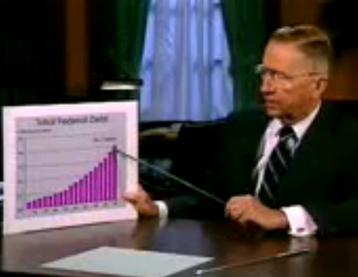
Bush’s problems with economic conservatives didn’t end with his victory in the primaries. In the general election, he faced an additional challenge from billionaire businessman Ross Perot, from Texas. Although Perot had never held public office before, he strongly advocated for balancing the federal budget. Unlike the two major candidates, he also opposed the North American Free Trade Agreement (NAFTA), saying it would cause a “giant sucking sound” from jobs leaving the country. Unconventionally, Perot announced his candidacy on Larry King Live. He continued to use television to his advantage throughout the campaign. Using his own wealth as funding, he ran infomercials to gain national attention. The programs often lasted a half hour or more and consisted of Perot sitting behind a desk explaining his economic proposals with graphs and charts. In fact, Perot did not appear in-person at campaign rallies until nine days before the election. Many voters connected with him thanks to his folksy and straightforward manner of speaking. When asked what he would do as president, he replied, “In plain Texas talk, it’s time to take out the trash and clean out the barns.” Thanks to a grassroots movement, Perot was on the ballot in every state. His running mate was Vietnam war hero (and former POW) James Stockdale.
The Campaign
Famously hung on the wall of the Clinton campaign “war room” in Little Rock, Arkansas, was a poster that read, “IT’S THE ECONOMY, STUPID.” The reductive phrase became the most accurate summary of the campaign. Clinton took full advantage of Americans’ impression that Bush had not done enough to fight the recession. Trickle-down economics was an easy target, now more difficult for Bush to defend that it had been Reagan. Bush was often aggressive towards Clinton, as he had been to Michael Dukakis four years earlier. This time, however, his campaign was missing a key part of its team. His former campaign manager, Lee Atwater, collapsed and died during a speech in 1991. Bush’s attacks on Clinton’s lack of patriotism and family values didn’t land quite as effectively as they had with Dukakis. With the economy on the line, voters were less interested in the kinds of undignified attacks that had dominated the 1988 campaign. Clinton’s campaign was also more popular with African Americans and young voters, most evident by his interview and saxophone performance on The Arsenio Hall Show.
Bush initially refused Clinton’s challenge to debate. Democrats responded by calling Bush a chicken. A young man in east lansing, Michigan, went so far as to wear a chicken suit to a Bush rally. Afterwards, other “Chicken Georges” starting appearing in Bush’s crowds. It became so common, that the candidate joined in on the joke, sometimes calling out, “Where’s that chicken?” before speeches. Bush supporters responded by releasing live ducks at a Clinton rally, joking that Clinton had ducked the draft. Bush eventually accepted the invitation to debate.
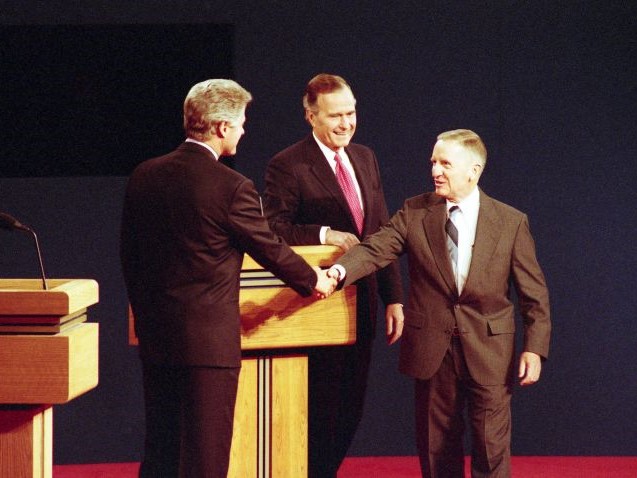
Surprisingly, the polling leader in May was… Ross Perot! It seemed like most voters were looking for an outsider candidate. Over the summer, however, Perot struggled to fend off attacks from both sides. Rumors also spread that his campaign staff was facing internal conflicts. In July, he unexpectedly announced the suspension of his campaign, again on Larry King Live, claiming that he did not want to split the electors and leave the election up to the House of Representatives. Later, he alleged that the Bush campaign threatened to release digitally altered pictures of his daughter, forcing him to drop out. In any case, he re-joined the race in October, though he never fully regained his momentum. He did still manage to qualify for the televised debates. It was the first time three candidates took the debate stage in the general election (third party candidate John Anderson debated Ronald Reagan in 1980, but Jimmy Carter did not join). In the first debate, Perot stole the show. When the moderator asked the candidates what distinguished themselves from the others, Bush and Clinton gave predictable answers about their experience. Perot, on the other hand, responded, “Well, they’ve got a point. I don’t have any experience in gridlock government, where nobody takes any responsibility for anything and everybody blames everybody else. I don’t have any experience in creating the worst public school system in the industrialized world, the most violent, crime-ridden society in the industrialized world. But I do have a lot of experience in getting things done.”
In the second debate, a town-hall format, Bush made a small, but costly misstep by checking his watch during an audience member’s question. The speaker asked how the national debt had affected each of their lives. Bush was confused by her wording (it would have made more sense to ask about the recession, rather than the debt), but even clarification by the moderator didn’t help him. In his answer, he seemed frustrated and dismissive. This reinforced the idea in viewers’ minds that Bush was out-of-touch, unconcerned, and distracted.
Election Day
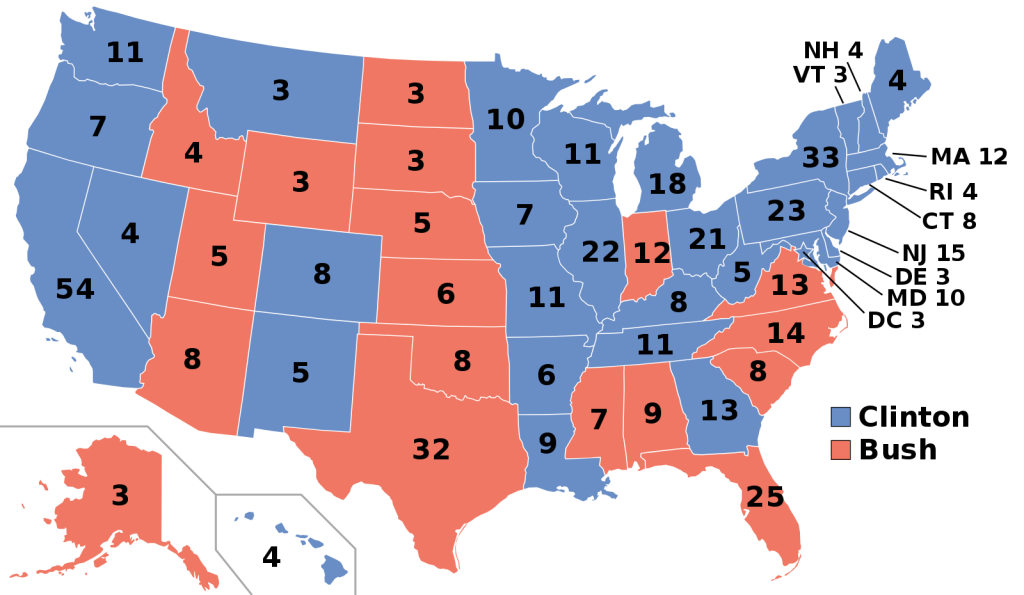
1992 saw the largest election turnout since 1960. Clinton performed best in the Northeast, Midwest, and West Coast. Democratic dominance of the coasts continues to today. Clinton also repaired the Democratic coalition by winning back Reagan Democrats, middle-class voters, and even a few Southern states. Perot had broad support across the country, but failed to win any states. Clinton’s home state of Arkansas (along with the District of Columbia) was the only state to be won by a majority of votes, not just a plurality.
The Winner
Bill Clinton won! He was America’s 42nd president. At 46, he was the youngest president since John F. Kennedy. The electoral score was 370-168. Clinton won 43% of the popular vote, Bush 37.4%, and Perot 18.9%. Bush had the lowest percentage of a major party candidate since Alf Landon in 1936, and the lowest for an incumbent president since William Taft in the three-way race of 1912. Similarly, Perot had the highest percentage for a third party candidate since Teddy Roosevelt from the same year. While many people considered Perot a spoiler for Bush, he actually took a significant number of votes from both major candidates. Of course, it surely didn’t help the incumbent president to be attacked from both sides. Democrats kept control of both houses of Congress. Americans hoped that Washington gridlock would be broken now that the Executive and Legislative branches were controlled by the same party.
What Did It Say About America?
It’s the economy, stupid! Bush wasn’t Reagan, but I think he could have pulled off a win if he had maintained the economic status quo. Once the recession hit, he had no chance. Although Clinton only won with 43% of the popular vote, it’s worth considering that 62% of people voted for not-Bush. The Democrats were successful, but as with Carter, they needed Southerner and an unpopular incumbent to pull it off. In other news, the Baby Boomers take power! They continue to hoard it to this day.
Was It The Right Decision?
Yes! …with the caveat that the media was right to be concerned about Bill Clinton’s personal life. Bush had a great resume before becoming president. Unfortunately for him, that also meant he was a member of the out-of-touch Washington elite. Like Herbert Hoover running against Franklin D. Roosevelt, voters needed to feel like the president was actually going to do something about the economic downturn. And like Michael Dukakis, one seemingly innocuous gaffe became a huge problem when it reinforced preexisting impressions about the candidate.
